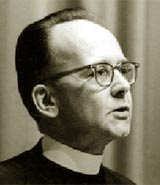Ong, Orality and Literacy

Walter Ong knew he wanted to be a priest at age 12, and indeed, from the time he was ordained in 1946 until his health no longer allowed it, he heard confessions and celebrated Mass most every weekday at 5:30 a.m. and most every Sunday at 7:30 a.m.; but from the early 1940s, he was also passionately devoted to questions of text, language and culture. He was born on this day in 1912 in Kansas City, Missouri.
While pursuing his ordination, he studied English at St. Louis University, where his Masters adviser was Marshall McLuhan. He was awarded 2 Guggenheim fellowships, one in England (1950) and the second in Paris (1952-3), where he lived with several other Jesuits, including Teilhard de Chardin (and read Teilhard's unpublished masterpiece, The Human Phenomenon); and finally received his Ph.D from Harvard in 1954 before settling down as a professor at St. Louis University. His early work concerned itself with Renaissance literature (Ramus, Method and the Decay of Dialogue, 1958) and contemporary Catholicism and spirituality (American Catholic Crossroads, 1959; In the Human Grain, 1967), but he would make his mark in the nexus between language, thought and culture.
Living in both the "oral" world of the Roman Catholic liturgy and the "literate" world of English literature no doubt made Father Ong acutely attuned to the differences between the two. In his best known, most often cited work Orality and Literacy: The Technologizing of the Word
First, he observes, where the primary mode of communication and preservation of traditions is oral, represented by written versions of oral pieces such as Homer's Iliad and Odyssey, rhetoric is characterized by repetition and aggregation (rather than an attempt to convey deeper analysis), with a sense of inviting the listener's participation in the event of speech (identifying the listener as a member of a group) and a bent toward living examples rather than abstract arguments -- much of which contributes to the ability of individuals in a group to remember spoken rhetoric, as well as to a kind of cultural conservatism, advanced through mnemonically perpetuated truths.
Ong's next argument is that the emergence of writing as a principal mode of cultural expression gradually restructured consciousness: it distances the originator of a message from the person receiving it, meaning that it cannot be directly questioned; it promotes the interiorization of thought, prompting the reader to see him or herself as situated in time rather than spatially within a group of like-minded listeners; and with words now being understood as things to be manipulated, an author's expression is less about recycling accepted knowledge than it is about evocations of new authority.
With "oral" and "literate" cultures as a backdrop, Ong's most influential ideas concerned the emergence of electronic media (a decade before the emergence of the Internet as a significant cultural force), in which he described its effect on consciousness as a "secondary orality," a self-consciously oral consciousness in which the groups with which we identify are much larger now with the aid of TV and radio. While Ong was careful not to suggest that literate consciousness is better than oral consciousness, or vice versa, his description of "secondary orality" and the complex interactions between literacy and orality within modern culture has provided us with tools for analyzing how human beings may think and who we might become in a post-literate society.
Father Ong passed away on August 12, 2003 in Richmond Heights, Missouri.
Labels: Christian History, Philosophy





2 Comments:
Actually, Ong didn't get his ideas from McLuhan. Ong studied New Criticism under McLuhan, and while at Saint Louis University, both became interested in noetic processes. McLuhan's Gutenberg Galaxy actually draws heavily from Ong's Ramus, Method, and the Decay of Dialogue (which is much more than a study of Renaissance literature).
Likewise, Innis wasn't McLuhan's teacher in the formal sense. McLuhan studied at the University of Manitoba and Cambridge University (where he studied New Criticism with F.R. Leavis), and had his Ph.D. by the time he got to Toronto where Innis was.
Finally, Ong's term secondary orality dates back to his 1967 book The Presence of the Word. While Presence was published more than a decade before the first TCP/IP wide area network (1984), it was published 2 years before ARPANET (1969).
I'm sorry to be nitpicky here, but you clearly do care about Ong--posting this on his birthday no less--so I thought you'd want to know.
John -- thanks for the clarifications. I've made a few changes to bring this into line. Yes, I do care about Ong -- Orality and Literacy was a book that changed my life, once upon a time.
Post a Comment
Subscribe to Post Comments [Atom]
<< Home